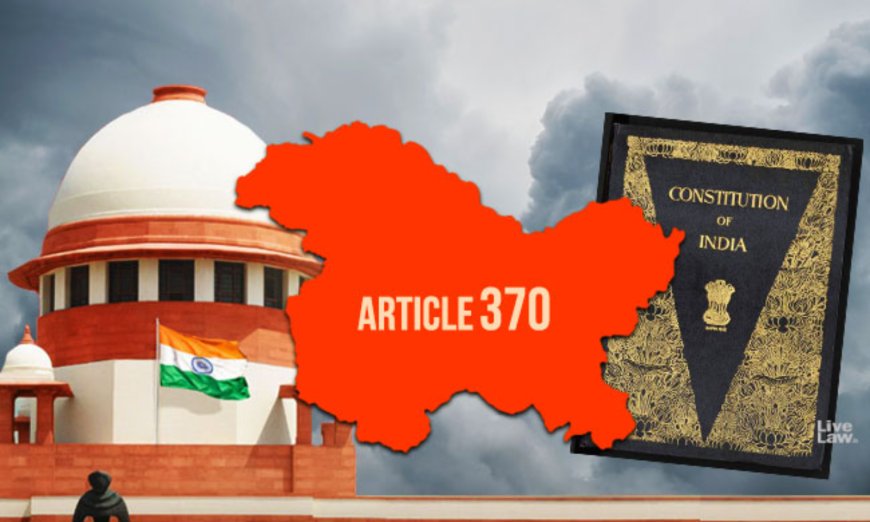Obligation of Article 370 of the Indian Constitution

Delving into the intricacies of Article 370 within the Indian Constitution requires a comprehensive understanding of its historical backdrop and legal obligations, particularly concerning the region of Jammu and Kashmir. Let's explore this provision from an advocate's standpoint, shedding light on its historical significance and legal ramifications in simpler terms
Historical Background:
Article 370 emerged against the backdrop of India's partition in 1947 and the subsequent accession of princely states to either India or Pakistan. Jammu and Kashmir, a princely state with a Muslim-majority population, acceded to India under unique circumstances, marked by the signing of the Instrument of Accession by its then-ruler Maharaja Hari Singh. The accession of princely states was a pivotal aspect of India's independence and the subsequent partition. While most princely states acceded to either India or Pakistan based on religious demographics or geographical proximity, the case of Jammu and Kashmir was particularly complex. Its diverse population, strategic location, and the outbreak of violence between communal groups added layers of intricacy to the decision-making process.
Special Status and Autonomy:
Recognizing the distinct circumstances of Jammu and Kashmir's accession, Article 370 was incorporated into the Indian Constitution by Dr. B.R. Ambedkar, the principal architect of the constitution, granting the state a special autonomous status. This provision aimed to provide temporary provisions for the state's governance until a more permanent solution could be reached, respecting its unique identity and historical context.
Article 370 delineated the terms of Jammu and Kashmir's relationship with the Indian Union, providing a framework for governance that acknowledged the state's historical autonomy and cultural diversity. It granted the state its constitution, separate laws, and decision-making authority in many matters, while also limiting the application of various provisions of the Indian Constitution to the state.
Key provision and legal obligations:
Autonomy and Governance: Article 370 conferred a significant degree of autonomy to Jammu and Kashmir, empowering its legislative assembly to enact laws and make decisions on various matters, including land ownership, citizenship, and residency rights, among others. This autonomy allowed the state to govern itself in several spheres, reflecting the aspirations and identity of its people.
Limitations on Central Authority: One of the notable aspects of Article 370 was its restriction on the central government's power to extend laws to Jammu and Kashmir. The Parliament required the state government's concurrence to apply many provisions of the Indian Constitution to the state, except in specific matters such as defense, foreign affairs, finance, and communications. This safeguarded the state's autonomy while preserving its unique legal framework.
Amendment and Alteration: Any changes or amendments to the Indian Constitution affecting the applicability of its provisions to Jammu and Kashmir necessitated the state government's consent. This ensured that alterations were made with the involvement and agreement of the state, reflecting a commitment to respecting its special status and autonomy within the Indian Union.
Interpretations and Contemporary Challenges:
Throughout its existence, Article 370 has been subject to various interpretations and debates, reflecting the diverse perspectives on its implications and relevance. Some argue for its retention, emphasizing its role in preserving the state's autonomy and identity, while others advocate for its abrogation, citing impediments to integration and development. Supporters of Article 370 contend that it serves as a constitutional guarantee of the state's autonomy and special status within the Indian Union. They argue that any attempts to dilute or abrogate this provision would undermine the principles of federalism and democracy, eroding the trust and confidence of the people of Jammu and Kashmir. On the other hand, critics of Article 370 argue that its special status has hindered the region's integration with the rest of India and impeded economic development and social progress. They contend that by maintaining separate laws and provisions, the state has missed out on opportunities for growth and prosperity, necessitating its abrogation or modification to facilitate greater integration and development.
Recent developments and legal implications:
In August 2019, the Government of India made a historic decision to abrogate Article 370 and reorganize the state of Jammu and Kashmir into two Union Territories: Jammu and Kashmir, and Ladakh. This monumental move marked a significant departure from the status quo and sparked a flurry of reactions, both domestically and internationally.
The abrogation of Article 370 triggered legal challenges and constitutional debates, raising questions about its legality, constitutionality, and implications for the region. Critics of the move argued that it was unconstitutional and violated the principles of federalism and democratic governance, while supporters hailed it as a bold step towards national integration and development.
From a legal perspective, the abrogation of Article 370 raised complex questions about the constitutional validity of the move, the legality of altering the state's status without its consent, and the implications for the region's governance and autonomy. Legal experts and constitutional scholars offered diverse interpretations and analyses, reflecting the contentious nature of the issue and the complex interplay of legal, political, and historical factors involved.
As an advocate, my opinion on Article 370 of the Indian Constitution is that it served a crucial purpose in providing special status to the region of Jammu and Kashmir. This provision respected the unique historical circumstances surrounding Jammu and Kashmir's accession to India and aimed to safeguard its autonomy and identity within the Indian Union.
Article 370 allowed Jammu and Kashmir to have its laws and make decisions on many matters, which reflected the aspirations and desires of its people. It provided a framework for governance that acknowledged the state's diverse population and historical context.
However, it's essential to acknowledge that Article 370 was a temporary provision, intended to provide a transitional arrangement until a more permanent solution could be reached. While it served its purpose for many years, there were debates and discussions about its relevance and implications for the region's integration and development.
Ultimately, the decision to revoke Article 370 in 2019 was a significant step taken by the Indian government. While opinions may differ on this decision, it's crucial to recognize that changes in legal and constitutional matters can have far-reaching consequences. As advocates, it's our responsibility to navigate these changes effectively and ensure that the rights and interests of all parties involved are protected to the best of our abilities.
Conclusion:
It is imperative to grasp the obligations and implications of Article 370 while navigating legal matters about Jammu and Kashmir. While recent developments have altered the landscape, understanding the historical context and legal nuances of this provision is crucial for advocating effectively on behalf of clients in this region. As the legal landscape continues to evolve, staying informed and adapting to changes will be essential in providing competent legal representation in matters concerning Article 370.












































